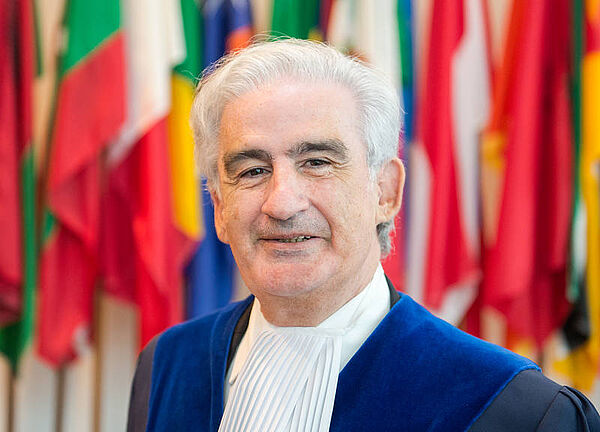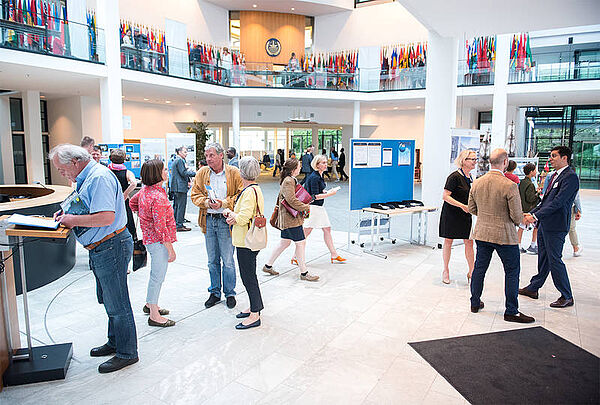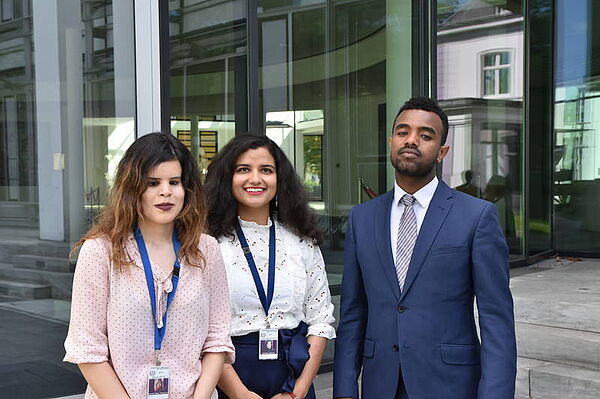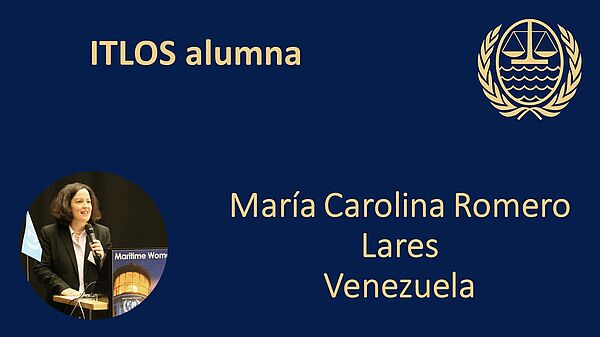Newsletter 2018/3
August 2018
Introduction
Welcome to the Tribunal’s third quarterly newsletter, which we are sending out after a period of three months in which the Tribunal has been particularly active in the field of capacity building. The core function of the Tribunal is clearly to adjudicate cases but it is nevertheless of paramount importance to transmit knowledge and information to younger generations in order to ensure that government officials, diplomats and students are made aware of the role of the Tribunal for the peaceful settlement of disputes.
With that in mind, the Tribunal has established a variety of training programmes which are either organized or hosted by the Tribunal both in Hamburg and further afield. One of these has just taken place at the seat of the Tribunal: the IFLOS Summer Academy. 41 participants from 30 States have followed a four-week course with modules on the law of the sea and maritime law, workshops on delimitation and visits to the Hamburg Port Authority and the GEOMAR Helmholtz Centre for Ocean Research Kiel. The academy closed with a moot court in the courtroom. The Tribunal welcomes the chance to play an active role in this academy: not only do the participants spend four weeks at its seat but a large number of ITLOS judges and Registry officials have given lectures during the Academy this year.
For six of the academy participants this is the beginning of a nine-month stay at the Tribunal. We are pleased that the ITLOS-Nippon Foundation Capacity-Building and Training Programme on Dispute Settlement under UNCLOS is entering its 12th year and look forward to accompanying the fellows on their course of lectures, workshops, training sessions and study visits and to supporting their research.
Our current interns have also been able to profit from the Summer Academy, attending a selection of lectures and the moot court. As the first stepping stone in the capacity building programme, the internship programme offers students the opportunity to spend three months embedded in a Registry department, be it the Legal Office, Library, Linguistic Services or Press Office. We are grateful for the recent commitment given by the Korea Maritime Institute to continue their financial support for this programme, which allows us to provide assistance to students from developing countries.
Last but not least, the 13th ITLOS regional workshop was held in Mindelo, Cabo Verde back in May, at which representatives of Angola, Benin, Cabo Verde, Democratic Republic of Congo, Côte d’Ivoire, Guinea, São Tome and Principe, Senegal and Togo and of the Sub-Regional Fisheries Commission attended presentations by myself, Judges Jesus and Bouguetaia, and Registrar Gautier on the procedure for bringing cases before the Tribunal, on urgent proceedings and advisory proceedings, and on the jurisprudence of the Tribunal regarding delimitation disputes and fisheries matters.
I presented the Tribunal’s annual report to the 28th Meeting of States Parties back in June, during which the Tribunal’s budget for 2019/2020 was approved. At a side event organized by the Permanent Mission of Germany to the United Nations at the German House in New York, I gave a well-attended lecture entitled: "Reflections on the Contribution of the ITLOS to Dispute Settlement and the Law of the Sea". As always when we meet with the representatives of the 168 States Parties, the strong support for the work of this institution and its future role in applying and interpreting the Convention, or any other agreement relating to it which confers jurisdiction upon the Tribunal, is notable.
I have also had the opportunity to give keynote statements and discuss emerging issues with both speakers and participants at a number of conferences over the three months ranging from Beijing to Malmö, Reykjavik and Valetta. The emphasis of each event has been different, be it fisheries, shipping, the interplay of science and law or ocean sustainability, but each conference has underlined the importance of the work that we have done since 1996 and will do in the coming years. As I stated in Malmö: “With the ever increasing uses of the oceans, the importance of the UNCLOS as a legal pillar of such governance is now greater than ever. However, the Convention cannot be expected to achieve its goal of establishing a legal order for the oceans unless and until State Parties implement it in good faith and comply with its provisions. Moreover, the Convention, which contains many inherently uncertain or ambiguous provisions, could easily be interpreted and applied differently by different States. That is why it is crucial that the Convention has authoritative mechanisms to ensure its uniform interpretation and application. I believe that the Tribunal, as a principal, if not exclusive, mechanism in this regard, has played an important role over the past two decades. The Tribunal has peacefully settled maritime disputes by authoritatively interpreting and applying the Convention and other international law. In so doing, the Tribunal has clarified and developed international law of the sea. As a consequence, it has fostered the positive attitude of States toward the rule of law and ocean sustainability. Admittedly its full potential has yet to be realized. I hope that the Tribunal will be able to make more valuable contributions to the rule of law at sea and ocean sustainability in the years to come.”
I hope that you enjoy reading the newsletter.
With my warmest regards,
Jin-Hyun Paik
President
ITLOS cases
In the M/V “Norstar” Case (Panama v. Italy), the oral proceedings will open on Monday, 10 September 2018; the schedule of the hearing is as follows:
First round of oral argument: 10 – 13 September
Panama
Monday, 10 September 2018: 10 a.m. – 1 p.m. and 3 – 6 p.m.
Tuesday, 11 September 2018: 10 a.m. – 1 p.m. (and 3 – 4:30 p.m. if required)
Italy
Wednesday, 12 September 2018: 10 a.m. – 1 p.m. and 3 – 6 p.m.
Thursday, 13 September 2018: 10 a.m. – 1 p.m. (and 3 – 4:30 p.m. if required)
Second round of oral argument: 14 – 15 September 2018
Panama
Friday, 14 September 2018: 3 – 6 p.m.
Italy
Saturday, 15 September 2018: 3 – 6 p.m.
ITLOS bench: Interview with Vice-President Attard (Malta)

You have been a Member of the Tribunal for a number of years. What do you consider to be the highlights of your Judgeship?
At the outset, I wish to record what a privilege and honour it is to serve in such a distinguished judicial body as ITLOS, which has greatly contributed to the development of the law of the sea. Coming from an academic background, I found the judicial decision-making process to be both a challenge and a great satisfaction, which however carries great responsibility. In this respect I recall the words of a distinguished ICJ Judge who referred to the ‘fear and ecstasy of he who must decide’. Another major highlight has been the pleasure of working with my distinguished colleagues who come from different legal systems and varied backgrounds. This has given me the opportunity to learn from their wisdom and experiences.
Whilst the ITLOS jurisprudence over the years has made a major contribution, particularly on the interpretation of the 1982 United Nations Convention, I wish to refer to some important decisions of the Tribunal in which I participated. With respect to fisheries, it is my view that the ITLOS has made a great contribution to the protection of coastal States’ sovereign rights over living resources in their EEZ. I believe that in the Panama-Guinea Bissau case, the Tribunal’s judgment ensured that the coastal States’ EEZ fisheries rights were effectively protected further when it held that the regulation by the coastal State relating to bunkering of foreign vessels fishing in the EEZ fell within the coastal States’ EEZ powers. Additionally, I wish to recall the Joint Declaration of Judge Kelly and myself with regard to a possible future dispute with respect to bunkering and the possibility of environmental harm.
Significant was also, I feel, the Advisory Opinion given by the Tribunal at the request of the Sub-Regional Fisheries Commission in West Africa. It provided a better understanding on the duties of flag States in combating illegal, unreported, and unregulated fishing. The Advisory Opinion has had a positive catalytic effect on State practice and at least four States have adopted new legislation implementing the Advisory Opinion. To my mind it demonstrated ITLOS’s capacity not only to deliver solutions in contentious disputes, but also to provide guidance on the interpretation of UNCLOS and related agreements. I should also state that I greatly appreciated participating in decisions dealing with the freedom of navigation, such as the case Netherlands-Russia. I also give great importance to decisions of the Tribunal which highlight the importance of the humanitarian dimension in the law of the sea.
What challenges for the Tribunal do you see in the future?
I was pleased to read about the widespread appreciation for ITLOS’s work expressed by delegates at the 28thMeeting of the State Parties. In my opinion however the Tribunal has to continue to promote its important role in the settlement of maritime disputes, focusing on the efficient and effective manner in which it conducts its deliberations, together with the legal expertise of its Members.
ITLOS should be well-prepared for the contemporary law of the sea challenges. I believe that with the current migration at sea crisis, the Tribunal may be confronted with disputes which involve a thorough understanding of the relationship between the law of the sea and human rights law. In the light of its jurisprudence and its insistence on taking into account humanitarian considerations in maritime disputes, the Tribunal is best suited to deal with these issues.
The international community is facing great pressures to create an effective and sustainable ocean governance regime. I have recently published a report, the fruit of the work of 58 experts, which has highlighted the problems of ocean governance, particularly those emanating from the unlikely possibility of amending the 1982 Convention, and the consequential fragmented and sectorial approach to ocean governance. Humanity requires a holistic approach in dealing with the protection of the oceans. It may be appropriate to recall the words of the 1982 Convention Preamble wherein the State Parties declare that the problems of ocean space are closely interrelated and need to be considered as a whole. More attention needs to be given to the interdependence between the oceans and the atmosphere. It is generally agreed that climate change is leading to ocean warming, acidification, and sea-level rise. These adverse effects could lead to requests for the settlement of disputes or for Advisory Opinions. I am pleased that the Tribunal has already given important decisions on the protection and preservation of the marine environment. Furthermore, it is constantly striving to keep abreast of contemporary challenges such as sea-level rise.
What are your tasks as Vice-President?
Apart from my statutory obligations as Vice-President, I am constantly working to promote ITLOS throughout the world. In this respect over the last nine months I have provided the opportunity for both the President and the Registrar to address senior government officials from over 50 States on the work of ITLOS. Capacity building in the field of peaceful settlement of disputes is of paramount importance. Training at IMLI has ensured that some 900 lawyers from over 142 States are well-aware of the role of ITLOS in the settlement of maritime disputes. In this respect I also support the capacity building efforts undertaken at ITLOS and IFLOS. Both efforts manage to congregate at ITLOS an impressive group of participants who are already, or will be, involved in the decision-making process of their country. Finally I believe in the importance of ITLOS developing closer links with organizations that are relevant to maritime activities. In this respect I have been promoting ITLOS with UN specialised agencies (such as IMO and FAO), together with international non-governmental maritime organizations particularly in the shipping field.
ITLOS conferences and events

ITLOS opened its doors during Hamburg’s diplomatic and consular night, welcoming more than 300 visitors on 15 May 2018. Visitors were invited to attend presentations on the Tribunal’s work, were guided around the building and provided with information on ocean-related issues. Presentation booths were also set up by the International Seabed Authority, the Alfred Wegener Institute Helmholtz Centre for Polar and Marine Research, the Federal Institute for Geosciences and Natural Resourcesand the GEOMAR Helmholtz Centre for Ocean Research Kiel. The UNESCO Institute for Lifelong Learning, the only other international organization based in Hamburg, also presented its activities at the open evening.
President Paik gave the keynote statement ‘Building Transformative Partnerships for Ocean Sustainability: The Role of ITLOS’ at the World Maritime University’s Global Ocean Conference from 8 to 9 May 2018, which brought together over 200 participants from more than 50 countries. His address is available here.
The President also attended the Global Ocean Regime Conference in Jeju on 15 May 2018, discussing – together with Judges Yanai and Chada – ways to enhance international cooperation in overlapping maritime areas. During the Center for Oceans Law and Policy 2018 Conference ‘Cooperation and Engagement in the Asia Pacific Region’, which took place from 23 to 25 May in Beijing, President Paik moderated the panel on shipping, while Judge Gao participated in the panel ‘Spotlight on regional cooperation’. At the close of May, Judge Jesus delivered a statement on behalf of the President during the Sixth International Symposium on ‘Scientific and Legal Aspects of the Regimes of the Continental Shelf and the Area’ in Wuzhen, China. Registrar Gautier gave a presentation entitled ‘The Seabed Disputes Chamber: an efficient forum in case of contractual disputes’ during the symposium, which was also attended by Judges Ndiaye, Gao, Bouguetaia, Kulyk, Cabello, Chadha and Kolodkin.
Judge Lijnzaad joined other judges serving on the bench of 12 other international courts and tribunals in Oslo from 30 May to 2 June 2018 to discuss contemporary challenges to the legitimacy of judicial institutions at the 12th session of the Brandeis Institute for International Judges, organized by the International Center for Ethics, Justice, and Public Life and co-hosted with the PluriCourts Center for the Study of the Legitimate Roles of the Judiciary in the Global Order, University of Oslo Law Faculty. The conference ‘From Strasbourg to Hamburg: the Human Dimension of the Law of the Sea’, which took place on 11 June 2018 at the T.M.C. Asser Instituut and the Law Faculty of the University of Basel saw Judge Lijnzaad chairing the panel discussion ‘Exploring other Approaches to Human Rights at Sea’.
Both the President and Registrar were invited lecturers at the FAO-IMLI International Fisheries Law Training Course, which opened on 25 June 2018. The course, jointly developed by the FAO and IMLI, hosts officials of national administrations responsible for fisheries governance, fisheries monitoring, control and surveillance, and law enforcement.
At the conference ‘New Knowledge and Changing Circumstances in the Law of the Sea’ held in Reykjavik from 28 to 30 June 2018, organised by the Law of the Sea Institute of Iceland and the Korea Maritime Institute, President Paik gave a keynote speech entitled “Disputes involving scientific and technical matters and the ITLOS, which is available here. Judges Hoffman and Heidar and the Registrar also participated in the conference.
The quarterly period closed with the participation of ITLOS judges in the Rhodes Summer Academy (President Paik and Judges Hoffmann and Heidar) and the IFLOS Summer Academy (President Paik, Vice-President Attard, Judges Jesus and Heidar, the Registrar and Deputy Registrar).
Capacity building

Internship programme
Presentations on ‘Article 121(3) of UNCLOS in the light of the Award of the Arbitral Tribunal in the South China Sea Arbitration’, ‘The Seabed Disputes Chamber or Commercial Arbitration?’ and ‘La coopération internationale en matière de répression de la piraterie maritime’ were given by the interns serving from April to June. The new group of interns, Thaissa Meira (Brazil), Arpita Sachdeva (India) and Yosef Senbeta (Ethiopia) arrived at the beginning of July and will be with the Legal Office until September.
On 26 June 2018, Mr Myung-Saeng Joung, Vice-President of the Korea Maritime Institute, signed a Memorandum of Understanding with the President of the Tribunal, agreeing to continue KMI’s commitment to provide financial support for the internship programme of the Tribunal. Every year up to 20 students and recent graduates participate in this programme, many of whom benefit from the availability of funding, which helps them with the travel costs to Hamburg and their living costs during the three months of the programme. Financial support to participants from developing countries is available from the Trust Fund for the Law of the Sea, to which contributions have been made by Korwind, the Korea Maritime Institute (KMI) and the Ministry of Foreign Affairs of the People’s Republic of China.
ITLOS-Nippon Foundation Capacity-building and training programme on dispute settlement under UNCLOS
The Tribunal welcomes six fellows on the 2018/2019 programme: Ms Zainaba Abdallah Bachirou (Comoros), Mr Boniface Adjokpo (Benin), Ms Xinling Mary-Elisabeth Chong (Singapore), Ms Grace Kaue (Papua New Guinea), Ms Olena Semenova (Ukraine) and Mr Julian Rosenthal (Argentina). Beginning with the four-week Summer Academy organised by the International Foundation for the Law of the Sea and hosted by the Tribunal, the fellows will undertake a nine-month intensive programme of lectures on law of the sea, environmental law, maritime law, maritime security, fisheries, human rights, climate change, ocean acidification and marine biological diversity, which will be given by a faculty of lecturers drawn from the Tribunal (Judges and Registry officials), UN organizations, universities, law firms and relevant institutions. Training sessions on the submission of disputes, conducting cases, drafting pleadings, negotiation, mediation and maritime delimitation, and a series of study visits to relevant institutions in The Hague, London, Brussels, Berlin, Kiel, Cuxhaven and Hannover complete the programme.
On 14 June 2018, the Registrar gave a lecture on the Tribunal’s activities to the participants of a sister fellowship programme, The United Nations – Nippon Foundation of Japan Fellowship Programme, Human Resources Development and Advancement of the Legal Order of the World's Oceans, coordinated by the Division for Ocean Affairs and the Law of the Sea.
IFLOS Summer Academy
41 participants from 30 States have just completed the four-week summer academy. After two weeks dedicated to the law of the sea (dispute settlement under UNCLOS, maritime zones, delimitation, offshore resources, ITLOS jurisprudence and ocean governance), the last two weeks have looked at maritime law (salvage and wreck removal, carriage of goods by sea, marine insurance, ship building and vessel financing, pollution and the ILO Maritime Labour Convention). In addition the participants have benefitted from trips to Kiel, the Baltic Coast and Berlin. The academy will close with a moot court in the courtroom.
Charles Rousseau Moot Court
The Tribunal’s involvement in moot court competitions continued this quarter with Registrar Gautier judging the final rounds of the Charles Rousseau Moot Court competition organized by the University of Angers in early May. Congratulations go to the winning team from the Université Aix Marseille and the runners up from the Vrije Universiteit Brussel. The finals of the competition were preceded by a colloquium ‘Les réfugiés en mer : droit des réfugiés ou droit de la mer ?’ in which Judge Lijnzaad addressed the topic 'Le TIDM, un forum conveniens ? Repousser les limites de la compétence selon le système de la CNUDM’.
Meet ITLOS alumni

María Carolina Romero Lares (Venezuela), ITLOS intern 2002 and IFLOS participant in 2009. Associate Professor at the World Maritime University in Malmö, Sweden
I became an intern at ITLOS in July 2002, while pursuing doctoral studies in Germany. At that time, I was eager to delve into the library in order to finish my research. I enjoyed being able to interact with judges and legal officers and gain a deeper understanding about the topic of my dissertation. It was also my first opportunity to get to know a UN institution from the inside.
After graduating, I started my career in the maritime field by working at the Venezuelan Maritime Administration, which allowed me to represent my country at the IMO and the IOPC Funds in London. My academic vocation led me to the Venezuelan Maritime University, where I lectured for a few years prior to 2009, when I attended the IFLOS Summer Academy. Updating my knowledge on different topics on the law of the sea and meeting experts in the field had a profound impact on me and somehow I started seeing or recognizing a part of me in those experts that surrounded me in Hamburg that summer. A couple of years later, I left Venezuela and moved to Sweden and started working as an Assistant Professor at the World Maritime University, where I teach law of the sea.
Looking back, I can now say that the experience at ITLOS was an awakening for me. I was inspired by what I saw and became deeply committed to my life career as a civil servant in this wonderful field, working and promoting the law of the sea, which is what I have done ever since. Since my arrival here at WMU, I have looked at ways to strengthen the ties between ITLOS and the University. In that sense, I organize a yearly field study trip to Hamburg to visit the Tribunal. So far more than 130 students from 54 countries have had the chance to call on the institution and witness its significance. For me, each year is a fresh opportunity to renew my maritime vows. In the meantime, something of great academic value happened in my scholastic career and I was invited to lecture at the IFLOS Summer Academy. This will be my fourth year collaborating and I try to deliver interactive workshops in hopes of inspiring all and in particular being a role-model for female students, trusting that a more gender-balanced maritime world for all will be possible someday with experts in the law of the sea working at the Tribunal and in academia.
Over the years, I have perceived how the presentations on the Tribunal become more complex and fascinating with the increased and diverse number of cases, a more balanced composition of the bench and the academic undertakings of the institution. I am confident that in the same way that the Tribunal and IFLOS have evolved, WMU will also continue to grow and expand and that our newly created WMU -Sasakawa Global Oceans Institute will have a substantial impact in our common arena.
Upcoming events
President Paik and Judge Heidar will be lecturing at the upcoming Yeosu Academy of the Law of the Sea.
See the Yeosu Academy website
Oral proceedings in the M/V “Norstar” Case (Panama v. Italy) open on Monday, 10 September 2018.
The next administrative session of the Tribunal will be held from 17 to 28 September 2018.

